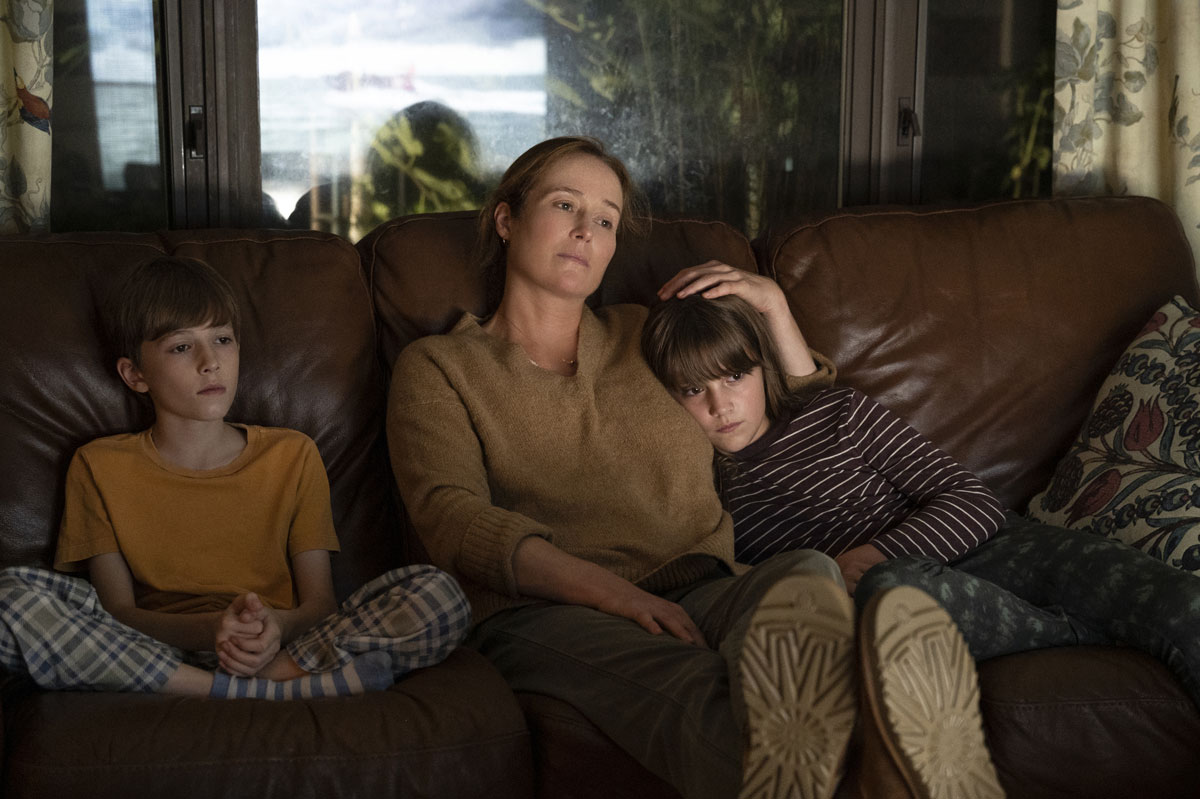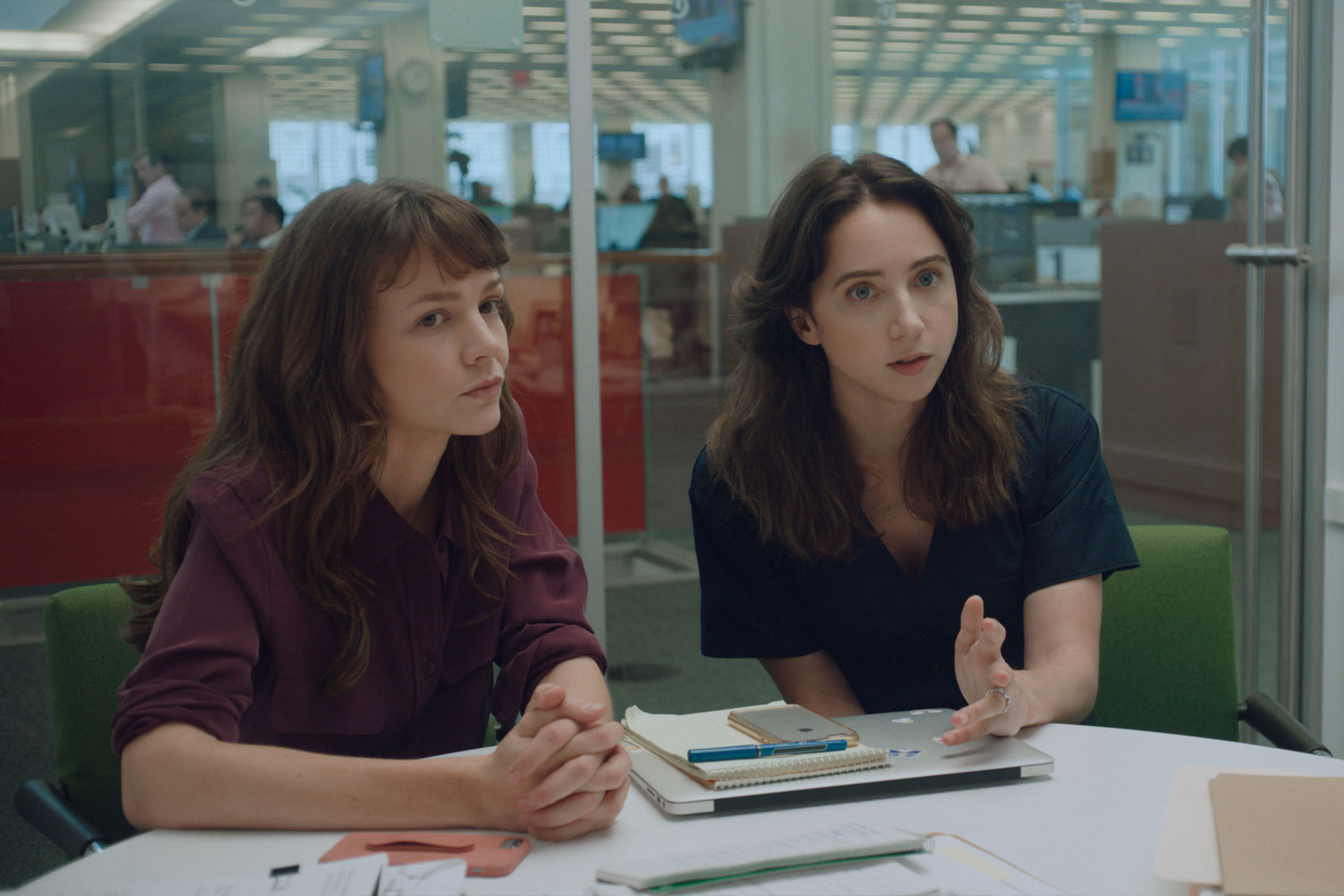The reporters take urgent calls, pacing down hallways. They’re awake long into the night, poring over documents, missing dinner at home that their romantic partners have prepared patiently. They show up late. They jet off to various locales, including abroad, trying to track down sources who may or may not talk. They’re followed at night by dark cars.
These could be scenes from any number of journalism movies – like “All The President’s Men,” or more recently, “Spotlight” – films as hard-hitting and dramatic as the investigations their leads try to crack. But “She Said,” the new film based on the 2019 book by Jodi Kantor and Megan Twohey, digs deep not into political intrigue or espionage, but abuse and sexual misconduct. And the hardworking, veteran journalists who break the case are not men. They’re women and they’re moms. That gives the film its strength – and also likely spelled its doom.
Directed by Maria Schrader and written by Rebecca Lenkiewicz, “She Said” is based on The New York Times investigation that reporters Kantor and Twohey conducted and wrote about in their book, the investigation that exposed the many crimes of Harvey Weinstein, now serving a 23-year prison sentence in New York. Both Kantor and Twohey are characters in the film, played by Zoe Kazan and Carey Mulligan, respectively.
The story starts when Jodi receives a tip that actor Rose McGowan was sexually assaulted by producer Weinstein. McGowan won’t comment on the record but does relate a horrific story to Jodi, who later talks with actors Gwyneth Paltrow and Ashley Judd about their own experiences with Weinstein. Jodi recruits Megan to help untangle the story, which is becoming bigger and bigger. The two track down former assistants of Weinstein, deal with NDAs and lawyers – and with the angry man himself.
Something else that may have punished the movie? It’s not only the story of women, it’s the story of mothers specifically.
The film was released at a typical time for such issue-driven Oscar bait: at the tail end of 2022, just in time to be eligible for awards consideration but not, it seems, able to break through the glass ceiling of Oscar noms, which skewed heavily white and male this year, as if overcorrecting for the last two years, when women won Best Director Oscars. No women were nominated at all for Best Director this year, and only seven women have been nominated for directing in the 95-year history of the Academy Awards.
The omission of nominations for “She Said” seems shocking, given the subject matter – the Oscars love to award weighty and timely dramas – the strong performances by critical powerhouses like Mulligan, and compelling, creative direction by Schrader, which features interesting meta twists like Judd playing herself in the film. But “She Said” is also critical of Hollywood, and those who aided and enabled one of its nastiest predators while silencing the women who suffered at his hands.
Most of the decorated films of 2022 tell stories of men, and “She Said” is not simply about women but survivors of sexual violence. Men feature very little in the film; they’re in supporting roles only. It’s one of the most refreshing things about the film; even its male villain is given much less screentime than his victims. But something else that may have punished the movie? It’s not only the story of women, it’s the story of mothers specifically.
 Hywel (Wesley Holloway), Laura Madden (Jennifer Ehle) and Iris (Justine Colan) in “She Said” (Universal Pictures)Jodi and Megan are both parents, and the parents of daughters. Early in the film, Jodi struggles to get out the door to work, her youngest hanging on her. Her older daughter takes the girl, and Jodi calls the child her “hero.” Megan is just back from maternity leave. The Weinstein story is her first assignment since returning to work, which is significant.
Hywel (Wesley Holloway), Laura Madden (Jennifer Ehle) and Iris (Justine Colan) in “She Said” (Universal Pictures)Jodi and Megan are both parents, and the parents of daughters. Early in the film, Jodi struggles to get out the door to work, her youngest hanging on her. Her older daughter takes the girl, and Jodi calls the child her “hero.” Megan is just back from maternity leave. The Weinstein story is her first assignment since returning to work, which is significant.
“She Said” touches on the postpartum depression that Megan and millions of others go through. One of them was Mulligan, who dealt with postpartum depression after the birth of her first child. She told People, she “felt very alone, and very scared, and also very confused by the whole experience.” Another one is Megan herself, who allowed her real-life struggle with postpartum to be part of the movie (it isn’t in the book). She described launching into the Weinstein investigation at the same time she was dealing with postpartum to People as “one of the most vulnerable periods in my life.”
Sometimes the biggest protection of all is to tell the truth.
It adds another dimension to the character, a real one. “She Said” doesn’t have men thwarting the female leads, all too common in films with so-called strong female characters; importantly, it doesn’t have other women standing as roadblocks to their continued success either. As editor Rebecca Corbett, Patricia Clarkson recognizes the difficulty Megan is having and quietly asks her what will help. It’s work that will assist her, and Megan launches herself into it.
Postpartum depression is a subtle thread but a powerful one, rendered realistically in the film, which treats motherhood not as hindrance but a strength. Several of the victims of Weinstein are mothers. For one of the first ones to agree to go on record (Jennifer Ehle as Laura Madden), it’s the deciding factor in breaking her silence. She doesn’t want her children to think she did nothing, that she could have helped others. In another small but massively important moment, Jodi’s young daughter reveals on a Zoom call she knows the word “rape,” that kids — boys — say it casually at school, and Jodi must walk the line both between protecting her daughter and not shaming her or lying to her. Sometimes the biggest protection of all is to tell the truth.
Want a daily wrap-up of all the news and commentary Salon has to offer? Subscribe to our morning newsletter, Crash Course.
Being a mom isn’t just about caring for someone. It’s about keeping them safe in a world that often wants both them — and you — dead.
We think of one of the defining characteristics of motherhood as nurturing. But being a mom isn’t just about caring for someone. It’s about keeping them safe in a world that often wants both them — and you — dead. Motherhood is about fierceness, grittiness, dogged persistence. It’s about never giving up, as somehow holding onto yourself while the demands of the unpaid and unappreciated job, and the expectations of our society, try to tear you apart, to erase you.
“She Said” is that very rare film that recognizes the work of mothers: at home and in the office, in the field where being mothers gives the reporters not just an air of empathy to their subjects, but an armor of steel. It’s not that they broke this story despite being moms. It’s they broke this story because they were moms.
“She Said” is available on Peacock and on demand.

